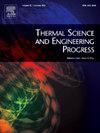Experimental study on diesel engine performance of tractor under transient conditions
IF 5.1
3区 工程技术
Q2 ENERGY & FUELS
引用次数: 0
Abstract
This paper conducts a systematic performance evaluation of the LOVOL M1204-D tractor and its matching diesel engine. Key performance parameters of the diesel engine are obtained through diesel engine bench tests and actual field tests of the tractor. The diesel engine bench tests include steady-state tests of universal characteristics and transient tests of constant-speed loading. In contrast, the tractor field tests utilize two types of agricultural implements, namely, the five-furrow plow and rotary tiller, to comprehensively measure critical indicators such as diesel engine speed, fuel flow rate, excess air ratio, intake and exhaust pressures and temperatures, as well as in-cylinder combustion parameters. Based on the experimental data, this paper quantitatively analyzes the performance characteristics and differences of the diesel engine, as well as the reasons for the differences under various operating conditions. The results show that during the constant-speed transient loading process of the diesel engine, parameters such as cyclic fuel injection, indicated torque can quickly reach a stable state. In contrast, the diesel engine torque, intake manifold pressure, exhaust manifold pressure, take longer to stabilize. Compared to the bench tests, the indicated thermal efficiency and effective thermal efficiency of the diesel engine during tractor field operations decline, and the coefficient of variation of the performance parameters increases significantly. Specifically, the coefficient of variation for combustion during from 10% to 90% reaches 18.00%, while the brake thermal efficiency decreases by 10.67%. This study provides a useful reference and guidance for the transient performance optimization of diesel engines.
求助全文
约1分钟内获得全文
求助全文
来源期刊

Thermal Science and Engineering Progress
Chemical Engineering-Fluid Flow and Transfer Processes
CiteScore
7.20
自引率
10.40%
发文量
327
审稿时长
41 days
期刊介绍:
Thermal Science and Engineering Progress (TSEP) publishes original, high-quality research articles that span activities ranging from fundamental scientific research and discussion of the more controversial thermodynamic theories, to developments in thermal engineering that are in many instances examples of the way scientists and engineers are addressing the challenges facing a growing population – smart cities and global warming – maximising thermodynamic efficiencies and minimising all heat losses. It is intended that these will be of current relevance and interest to industry, academia and other practitioners. It is evident that many specialised journals in thermal and, to some extent, in fluid disciplines tend to focus on topics that can be classified as fundamental in nature, or are ‘applied’ and near-market. Thermal Science and Engineering Progress will bridge the gap between these two areas, allowing authors to make an easy choice, should they or a journal editor feel that their papers are ‘out of scope’ when considering other journals. The range of topics covered by Thermal Science and Engineering Progress addresses the rapid rate of development being made in thermal transfer processes as they affect traditional fields, and important growth in the topical research areas of aerospace, thermal biological and medical systems, electronics and nano-technologies, renewable energy systems, food production (including agriculture), and the need to minimise man-made thermal impacts on climate change. Review articles on appropriate topics for TSEP are encouraged, although until TSEP is fully established, these will be limited in number. Before submitting such articles, please contact one of the Editors, or a member of the Editorial Advisory Board with an outline of your proposal and your expertise in the area of your review.
 求助内容:
求助内容: 应助结果提醒方式:
应助结果提醒方式:


